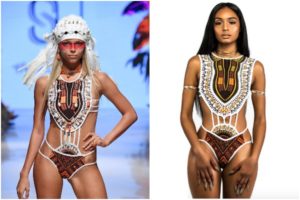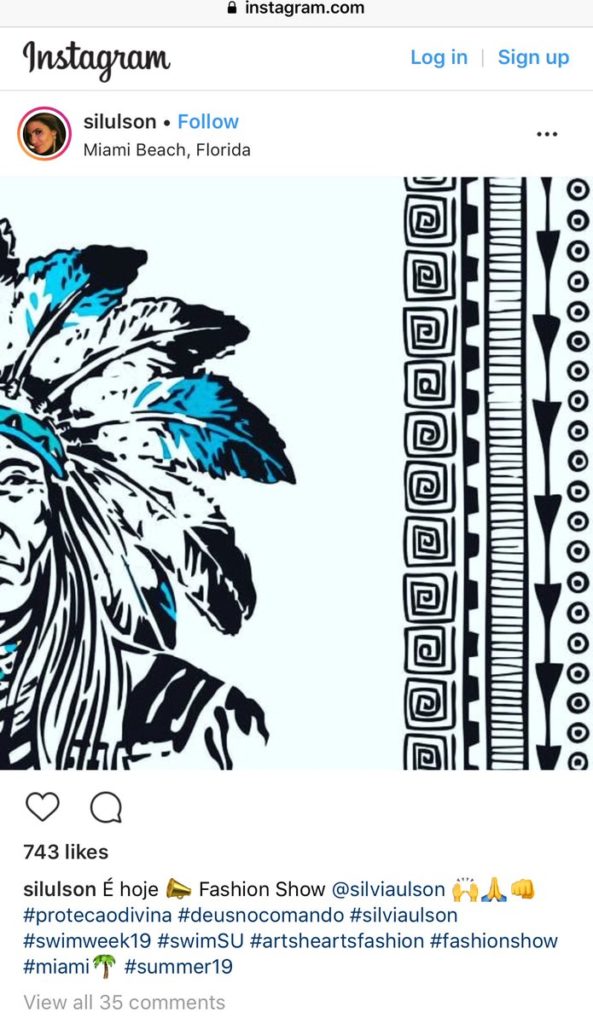
(Arun Nevader/Getty Images for Art Hearts Fashion/Bfyne)
A Nigerian swimwear company is taking aim at a Brazilian fashion designer who ripped off the brand’s Dashiki print bathing suit.
A representative for Bfyne told The Huffington Post that Silvia Ulson’s one-piece swimsuit bares an uncanny resemblance to one from their 2017 “Sahara” line called Kenzo. Other swimsuits mock the designs of Dashiki-inspired print found on the Ini and Ziba suits, too.
“That was extremely important for us to execute properly. We wanted to bring sexy to dashiki print and change the way the print was being looked at, ultimately transforming it into something no one has ever seen before,” the rep said. “We live and breathe our culture, and we made it our mission to showcase that through our designs and the dashiki print.”

“It came to us as a complete surprise how another designer is allowed to showcase replicas and claim it as her work during Miami Swim Week,” Bfyne’s rep said before noting the entire team was “completely flabbergasted.”
The representative also said Ulson having models strut down the catwalk in feather headdresses seemed to show the accessories were meant to ”[deceive] people to think the print and design were Native American-inspired.”
The rep said the team discovered the Ulson’s designs on Instagram and was also alerted to the plagiarism by former Bfyne models who were at Ulson’s show. Another member of the Bfyne team flew to Miami to meet with Ulson, who didn’t apologize and instead insisted the designs were her personal work. She had also met with members of the South American tribe, Krukutu.
Ulson has since issued a lengthy statement to Fashion World Online, which the website has translated from Portuguese.
She insisted that the designs, which were meant to shed a spotlight on Brazilian culture, were all inspired by “Native American Brazilians.”
“I spoke with this person called Fernando: he came personally to my store and told me that some days he would come back with some samples. I thanked him and I was waiting for this gentleman to come back,” she said. “After a few days, he brought me the samples. At first, I did not like them, but he told me they were great, and that it would be very important to have these prints so that everything was not black and white.
“I paid for his creation and for producing each sample. I was grateful and added those bikinis he made for me in the collection I showed at the show in Miami,” Ulson added.
Then, she detailed a meeting she had with a man from France, who told her the designs “were not from Native Americans but from him, that it took him 3 years to build his business.”
She explained she had never seen his prints and the unnamed man asked Ulson to have her attorney contact him when she got back to Brazil.
“At no time did anyone from Bfyne, or anyone giving their full name, contact me,” she says, noting it was the man who asked her to remove his designs from Instagram. Ulson also noted she discovered some of the dashiki designs she googled claimed to be made by the brands on the websites.
John Adele, Bfyne media director, told FWO that some of the pictures featured on sites like Amazon and Etsy, actually use some of the company’s models.
“A stranger came into my house, I have received threats on Instagram, and my goal was simply to put on a fun show, as I have since 2005,” Ulson told the website. “I paid for the patterns in question, and it was supposed to be a show of cultural pride. Instead, I was sold prints that appear everywhere, and it is possible others have been, too.”
In response to the cultural appropriation, Twitter users are furious.
“Nope! Nigeria. Sílvia Ulson is a thief! She stole those designs from a Nigerian designer.”
“Wow Silvia Ulson should be really embarrassed for plagiarizing and cultural appropriation 🤮🤧.”
Soooo #SilviaUlson is stealing and appropriating she has hit a level of sleazy usually only seen in the music industry. pic.twitter.com/NbDsFnPJXD
— AChicagoan (@akeyachicago) July 18, 2018

